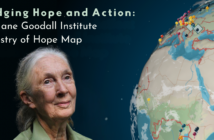In January 2016, I decided to stop eating meat. It wasn’t a New Year’s resolution because it wasn’t the same as deciding to eat less sugar or exercise more. This decision felt like a natural change for me. I was becoming tired of ignoring the guilt I felt each time I ate meat. At the same time, I was learning more about the livestock industry’s impact on the environment which brought the issue further to my attention. I’m here to tell you that there’s more to deciding to eat less meat than just loving animals.
I used to think that people were vegans or vegetarians for one of the following reasons: 1. They didn’t eat meat because that’s how they grew up, 2. They did it for health reasons or because it was trendy, or 3. They were the aforementioned animal-lovers who felt a moral obligation to refrain from eating meat. I never really took the time to understand why some people were vegan or vegetarian and certainly never considered it as an option for myself.
Within the last year or so I’ve learned more about the threats to our natural environment, and the livestock industry has often come up as a subject of debate.
Here are just a few reasons why eating less meat could be a great decision if you want to help the environment.
- Deforestation: The production of livestock, especially cattle, requires a lot of land for both grazing and producing feed for the animals. One example of this is in the Amazon. Brazil is one of the biggest producers of beef, and livestock and feed crops are at the top of the leading causes of destruction in the Amazon.
- Greenhouse gas production: Global livestock are accountable for about 14 to 15 percent of all greenhouse gas emissions relating to humans.
- Water use: Combining the water needed to grow the crops for animal feed, the water consumed by the animal, and the water used in other parts of production, it takes about 1840 gallons of water to produce 1 pound of beef.
In addition to all of the current issues that come with the amount of livestock we produce and consume, matters become worse as the world’s population increases. The current world population according to the UN is about 7.3 billion and is projected to reach about 9.7 billion by the year 2050. More people means a need for a greater production of food. This will likely lead to a larger demand for meat. According to an article from the Woods Institute for the Environment at Stanford, “worldwide consumption of pork, beef, poultry, and other livestock will double by 2020.” This means more land will be needed to grow feed (grain and soybeans) and more will be converted to pastureland to graze cattle.
People always ask me if I miss eating meat or if I ever crave the meals I used to eat; sometimes, I do. However, I never have to think to myself, “why don’t I just eat that buffalo chicken wing?” because I know all of the reasons why I stopped in the first place. I’m motivated by the knowledge that each day I don’t eat meat, I am reducing my negative impact on the environment.
If you’re wondering if you should make a change to your diet to help animals and the environment, here are some ideas for getting started:
- Start small! The Meatless Monday movement is growing. Why not give it a try? Look up some vegetarian recipes and start experimenting. You might even find that being vegetarian or vegan is a lot less difficult, and much more delicious, than you expected. In addition, you don’t have to stop eating all animal products immediately to help the environment. Just eating less meat a few days a week can make a great impact.
- Don’t shame those who do eat meat. Nobody likes being told that something they’ve done every day of their life is wrong. Our eating habits are closely tied with our culture and our image of who we are, so changing your eating habits is a very personal choice. Explain to your friends and family what you’ve learned, if they are willing to listen, but don’t tell them that by eating meat they are bad people. Many people (I was a perfect example) have never even considered what it would mean to eat less meat.
- Do your research. Being a vegan or vegetarian can be great for your health if you know what you are doing. If you decide to start eating fewer animal products, you shouldn’t just rely on unhealthy, processed foods like Oreos (yes, they’re vegan!) and call it a day. Figure out alternative sources of protein so that you are able to maintain a healthy, balanced diet.
- Further your knowledge. There are many informative documentaries and books about animal agriculture and the livestock industry. You’ll be surprised at how much you learn!






